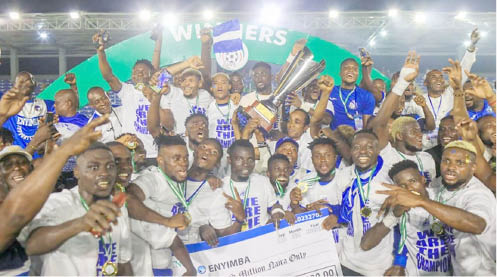The European Union Electoral Observer Mission (EU EOM) on June 27 in Abuja formally released the final report of its observation of the 2023 general elections held on February 25, March 18 and April 15.
This led to controversy as the 94-page report with 23 recommendations for consideration by Nigerian authorities, and reforming six priority areas, was received with mixed feelings.
However, facts have emerged that none of the local and foreign observers accredited for the 2023 General Elections deployed an adequate number of people to cover up to 10 per cent (or 17,661) of the total 176,606 polling units (PUs) across the country used for the exercise.
Pundits said this puts a big question mark on the reliability, objectivity and accuracy of their assessments.
NIGERIA DAILY: Who Succeeds Abdullahi Adamu?
Gov Buni breaks jinx, fulfils generational hope on road construction
According to the figures obtained from the Independent National Electoral Commission (INEC), 190 local and 34 foreign observer groups applied and were accredited to observe the 2023 General Elections.
But the overall deployment statistics revealed that the monitors did not make adequate provision for personnel to cover the polls in each of the 36 states and the Federal Capital Territory (FCT).
While only a handful of the groups sent limited number of observers to the 36 states and the FCT, the majority could only cover a few states, with many deploying only one observer to a state.
INEC conducted the 2023 elections in 176, 606 PUs spread across 8,809 Wards in 774 local government areas, in 36 states and the FCT.
Commenting on some of the reports submitted to INEC, a political science expert, who insisted not to be named, said to derive an objective and near-accurate assessment of such a massive exercise, an observer group should ordinarily and adequately cover at least 60 per cent of the total polling units across the country, translating to 105,963 PUs.
While some of the observers sent a disproportionate number of observers to the FCT, Lagos and Delta states, many others deployed a limited number of observers to states citing security issues.
The figures obtained were contained in the observer groups’ submissions to INEC.
For instance, YIAGA Africa said it deployed 5,676 observers across the 36 states and the FCT. Specifically, while it sent 1,027 observers to the FCT, which has 2,822 PUs, only 469 observers were deployed to Kano State with 11,222 PUs; 425 observers went to Delta State with 5,863 PUs; 258 observers covered Lagos with 13,325 PUs; 117 observers were deployed to Anambra with 5,720 PUs, while only 110 observers went to Niger with 4,950 PUs.
Also, the Centre for Democracy and Development (CDD) reportedly deployed 5,345 observers to the 36 states and the FCT.
Also, 168 observers were sent to Benue State with 5,102 PUs; 124 to Imo State 4,758 PUs, 98 to Ondo State’s 3,933 PUs, 84 to Taraba State’s 3,597 PUs, 73 to Zamfara State 3,529 PUs and 78 to Kebbi State 3,743 PUs.
On its part, the Nigerian Civil Society Situation Room/Policy and Legal Advocacy Centre said it deployed only 2,410 observers nationwide, out of which 101 went to Oyo State with 6,390 PUs; 102 to Katsina State with 6,652 PUs, 63 to Adamawa State’s 4,104 PUs; 72 to Rivers 6,866 PUs, 50 to Plateau State’s 4,989 PUs and 80 to Kogi State 3,508 PUs among others.
Equally, the Cardinal Onaiyekan Foundation deployed just 92 observers to 30 states, which include three observers each to Lagos, Nasarawa, Niger, Sokoto, Taraba, Enugu, and Abia states; and one observer each to Akwa Ibom, Anambra, Bauchi, Benue, Imo, Ondo, and Rivers states.
On its part, ActionAid Nigeria sent 700 observers to 17 states, including 103 to Enugu State; 118 to FCT; 84 to Kano State; 14 to Niger State; 74 to Rivers State, one to Imo State; 108 to Lagos State and 15 to Yobe State.
The Civil Society Legislative Advocacy Centre (CISLAC) deployed 190 observers to 15 states, including 30 each to Benue and Borno states; 25 to Kaduna State; and one each to Cross River, Delta, Gombe, Katsina, Kebbi, Kogi, and Plateau states.
In the same vein, international observers deployed limited monitors.
The European Election Union Observation Mission (EU-EOM) could only muster 172 observers for the 36 states and FCT.
While it sent the highest number of observers of 74 to the FCT alone, 16 observers were deployed to Lagos State; and eight each sent to Kano and Plateau states.
Only one observer each went to Kebbi, Kogi, Ogun, Ondo, Taraba, Yobe and Zamfara states.
The International Republican Institute (IRI) assigned 50 observers to 10 states, with 41 of them covering the FCT alone and the remaining nine sent to nine states of Adamawa, Delta, Ebonyi, Imo, Kaduna, Kano, Ondo, Osun, and Plateau.
Also, the National Democratic Institute (NDI) deployed 100 observers to 11 states, with 89 or 89 per cent of the total number covering the FCT alone.
The ECOWAS Mission deployed 284 observers for 31 states, 75 of which covered the FCT, 27 went to Lagos State; 21 to Kano State; 7 to Niger State, and three each to Abia, Cross River, Ebonyi, Imo and Osun states among others.
A management official of INEC, who cannot be named as the official was not authorised to speak on the matter, said the implication of the development is that no observer group can authoritatively produce an overall accurate and objective assessment of the 2023 elections.
“Nigeria is vast and massive geographically. Therefore, for the 2023 General Elections, the best thing is for each observer group to produce its report based only on the areas that it covered and do so fairly.
“Doing otherwise would amount to a conjecture and outright dishonesty. But what we have seen is that every observer group is now making definitive statements as if it covered the entire country, which is really not the case,” the official said.
The official also noted that the Nigeria Civil Society Situation Room, which deployed about half of the number of observers deployed by YIAGA and the CDD, has curiously been more vocal about the election than everybody else, especially, making several statements about the elections, which gave the impression that it adequately covered the entire country, when it did not.
During a recent presentation of its report in Abuja, the Situation Room asked the INEC Chairman, Prof. Mahmood Yakubu, to apologise to the country for conducting a flawed election. Also, the Situation Room, in a statement, said it conducted a post-election survey, which ‘exposed a significant dip in citizens’ confidence in the INEC’.
There were no details of the survey.
But the Chairman, Partners for Electoral Reforms (PER), Mr Ezenwa Nwagwu, countered the Situation Room, insisting that the idea that INEC Chairman should apologise to Nigerians was not part of the report jointly agreed upon.
Nwagwu, who spoke at the venue of the event where the Situation Room Report was unveiled, also disagreed that nothing good came out of the 2023 elections.
He noted that the Yakubu-led INEC managed to conduct the election on schedule without postponing it, as witnessed in 2011, 2015 and 2019, despite an avalanche of challenges.
“I am not saying that there were no issues. An election is not a church service. The election is a competitive enterprise. We give comfort to the real people who cause challenges in the election. INEC does not cause voter suppression. Politicians do, in collaboration with disgruntled INEC officials. INEC does not unleash violence; politicians unleash violence and their political parties.
“Now, 90 per cent of the time, in discussing the 2023 election, you focus on INEC, and you leave the role of security agents. You leave the role of the political parties and their candidates and the role they play in making bad elections.
“INEC officials were killed in the 2023 election. They are Nigerians. INEC officials were kidnapped. By whom? Who kidnapped them? Who murdered them? We provide comfort for the political class and their inability to embrace reforms and conduct themselves in a manner that allows for free and fair elections?” Nwagwu queried.
A senior INEC official, who pleaded not to be named, also told Daily Trust that INEC is not interested in confrontational approach as it will still need to work with the CSOs and election observers, both local and international.
“It is better for us and the nation to jaw-jaw than to war-war, irrespective of our feelings,” the official said.
Speaking on the matter, a political scientist, Prof. Sadeeque Abba, said that the reports of all international election observers have never been scientific, objective, or sacrosanct.
According to him, such reports are not products of a well-defined processes and procedures that project’s factuality, reality, and neutrality.
“So, to accept the reports as evidence in itself, for itself and by itself is tantamount to disservice to collective interests, will, and political stability of a nation. Every election observer represents an interest, agenda, and goal.
“Most times, such conflicting interests usually create a huge doubt, and integrity gaps in the reports. My take is that every election observer is first and foremost, an election tourist and a democratic sight-seeing. But at worst, election observers should be seriously monitored in the interest of national peace, stability and security,” Prof. Abba, a former Deputy Vice Chancellor, University of Abuja said.
“It is better for us and the nation to jaw-jaw than to war-war, irrespective of our feeling, the official said.

 Join Daily Trust WhatsApp Community For Quick Access To News and Happenings Around You.
Join Daily Trust WhatsApp Community For Quick Access To News and Happenings Around You.


